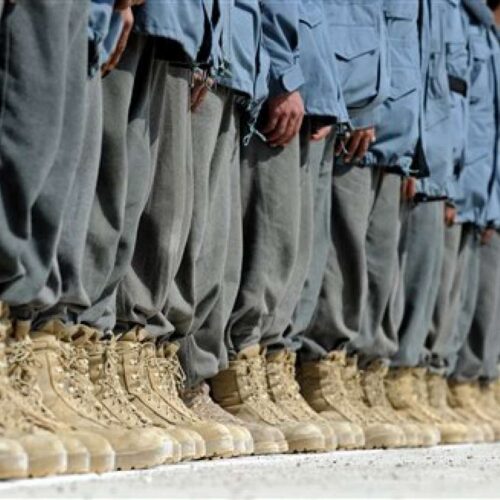Introduction
The U.S. government pumped $3.5 billion into foreign police forces in 2009, an amount nearly 2,000 percent higher than the last time spending on overseas law enforcement was tallied two decades ago, the Government Accountability Office found.
Not surprisingly, most of the 2009 money – nearly $2 billion – went to train police forces in Afghanistan and Iraq, according to the report. Afghanistan received $1.6 billion while Iraq got $377 million, and virtually all of the funding came from the Pentagon and State Department.
Questions have been repeatedly raised about whether American taxpayers are getting their money’s worth from the billions of dollars spent to rebuild civilian police forces in both countries.
For example, Afghan authorities don’t know how many police they have or whether everyone on payroll is doing their job, according to an audit released earlier this week by the special inspector general for Afghanistan reconstruction. The watchdog found poor recordkeeping for $1.5 billion spent by the United States and other international donors on an Afghan National Police program over several years.
About 21 percent of Afghan police employees are still paid in cash, which contributes to skimming and other forms of corruption, the watchdog said.
All told, the United States has spent about $10 billion since 2002 to rebuild the Afghan National Police, providing housing, equipment and salaries, according to the special inspector general’s report. A few weeks ago, Congress appropriated nearly $12 billion to pay for more training of both the Afghan civilian police force and the Afghan army.
Stuart W. Bowen, Jr., the special inspector general for Iraq reconstruction, testified Monday about the billions of dollars spent to help train, staff, and equip police forces in Iraq over the past decade. Over 400,000 Iraqi police have received training, he said, “but we found that the capabilities of these forces are unknown because no assessments of total force capability were made.”
Bowen issued a report last October detailing how the U.S. government poured $7.3 billion into Iraq’s police force over the past seven years. The lack of a comprehensive training plan or benchmarks to measure progress “undoubtedly” led to wasted money, he concluded.
In the new GAO report detailing 2009 spending, it said most of the federal money that went to Afghanistan police was intended to help fight drug trafficking, terrorism, insurgents and other crime.
The 2009 money sent to Iraq’s Security Forces was designed to help the police “attempt to reach minimum essential capabilities and assume responsibility for the country’s internal security,” the GAO said. In 2011, the Pentagon will stop funding police training in Iraq and hand the program over to the State Department as U.S. troops are drawn down.
American spending on foreign police forces is a sensitive issue. The GAO said it last tallied up the figures in 1992, concluding that the U.S. government spent $180 million, adjusted for inflation, in 125 countries.
In 2009, the government sent a total of $3.5 billion to help police in 107 countries fight drug smuggling, terrorism and other crimes. Most of the money came from the Pentagon and State Department, but the total includes small amounts also spent by the U.S. Agency for International Development, and the Energy and Justice Departments, the GAO said.
While Afghanistan and Iraq accounted for the majority of the 2009 spending, a handful of other countries each received more than $100 million. They were Colombia, Mexico, Pakistan and the Palestinian territories.
Although an amendment in the U.S. Foreign Assistance Act specifically bars assistance to foreign police forces, a variety of loopholes and exemptions allow federal money to be spent on overseas policing.
The United States has assisted foreign police forces since the 1950s, but it became unpopular in the 1970s due to concern that American funds were flowing to countries with poor human rights records. As a result, a 1974 amendment to the Foreign Assistance Act banned the use of aid money appropriated under that law to train, advise or support overseas law enforcement forces or prisons.
But a variety of exceptions passed since have created loopholes, the GAO said. For example, activities by the Drug Enforcement Administration and FBI are exempt. As well, countries that have a “longstanding democratic tradition,” lack a standing army and do not engage in a “consistent pattern of gross violations of human rights” are also exempt and can receive foreign assistance for police activities.
Yet some recipients have had human rights violations in their police forces, specifically security forces in Colombia and Mexico, the GAO report showed. Mexico received about $327 million in 2009 while Colombia got $205 million.
USAID spent an estimated $37 million in Colombia, Mexico and Guatemala in 2009, the GAO said.
The agency’s spending in Colombia focused on helping police respond to human rights violations, while in Guatemala it encouraged police to work with local communities to prevent crime. In Mexico, the USAID funding went to helping law enforcement agencies protect witnesses and set up restitution services for crime victims.
Read more in National Security
National Security
VA medical centers in hot water for failing to follow sterilization training
National Security
FBI still struggles to recreate itself as intelligence-driven agency
Report: Next FBI chief must focus on using intelligence to fight terrorism, not prosecutions


Join the conversation
Show Comments